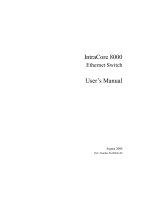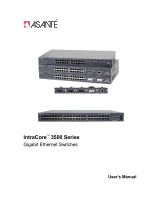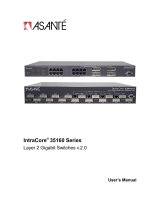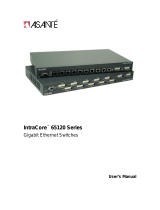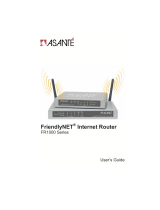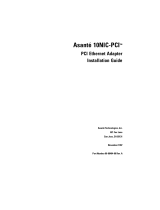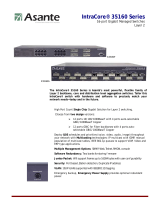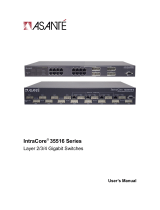Page is loading ...

IntraChassis 9000
Ethernet Switch
User’s Manual
GLXY9.book Page 1 Thursday, February 17, 2000 3:04 PM

Copyright Notice
All rights reserved. No part of this manual, or any associated artwork, software, product, design or design
concept, may be copied, reproduced or stored, in whole or in part, in any form or by any means mechani-
cal, electronic, optical, photocopying, recording or any other wise, including translation to another lan-
guage or format, without the express written consent of Asanté Technologies, Inc.
Trademarks
Asanté Technologies and NetStacker are trademarks of Asanté Technologies, Inc. Ethernet is a registered
trademark of the Xerox Corporation. All brand names and products are trademarks or registered trade-
marks of their respective holders.
FCC Information
This device complies with part 15 of the FCC Rules. Operation is subject to the following two conditions:
(1) this device may not cause harmful interference and (2) this device must accept any interference received,
including interference that may cause undesired operation.
Operation of this equipment in a residential area is likely to cause interference, in which case, the user, at
his or her own risk and expense, will be required to correct the interference.
LIMITED FIVE YEAR WARRANTY
Subject to the limitations and exclusions below, Asanté warrants to the original end user purchaser that the
covered products will be free from defects in title, materials and manufacturing workmanship for a period
of five years from the date of purchase. This warranty excludes fans, power supplies, non-integrated soft-
ware and accessories. Asanté warrants that the fans and power supplies will be free from defects in title,
materials and manufacturing workmanship for one year from date of purchase. Asanté warrants that non-
integrated software included with its products will be free from defects in title, materials, and workmanship
for a period of 90 days from date of purchase, and the Company will support such software for the purpose
for which it was intended for a period of 90 days from the date of purchase. This warranty expressly
excludes problems arising due to compatibility with other vendors products, or future compatibility due to
third party software or driver updates.
To take advantage of this warranty, you must contact Asanté for a return materials authorization (RMA)
number. The RMA number must be clearly written on the outside of the returned package. Product must
be sent to Asanté postage paid. In the event of a defect, Asanté will repair or replace defective product or
components with new, refurbished or equivalent product or components as deemed appropriate by Asanté.
The foregoing is your sole remedy, and Asanté's only obligation, with respect to any defect or non-confor-
mity. Asanté makes no warranty with respect to accessories (including but not limited to cables, brackets
and fasteners) included with the covered product, nor to any discontinued product, i.e., product purchased
more than thirty days after Asanté has removed such product from its price list or discontinued shipments
of such product.
This warranty is exclusive and is limited to the original end user purchaser only. This warranty shall not
apply to secondhand products or to products that have been subjected to abuse, misuse, abnormal electrical
or environmental conditions, or any condition other than what can be considered normal use.
ASANTÉ MAKES NO OTHER WARRANTIES, EXPRESS, IMPLIED OR OTHERWISE, REGARDING THE
ASANTÉ PRODUCTS, EXCEPT TO THE EXTENT PROHIBITED BY APPLICABLE LAW, ALL WARRANTIES OR
CONDITIONS OF MERCHANTABILITY OR FITNESS FOR A PARTICULAR PURPOSE ARE HEREBY DIS-
CLAIMED. ASANTÉ’S LIABILITY ARISING FROM OR RELATING TO THE PURCHASE, USE OR INABILITY
TO USE THE PRODUCTS IS LIMITED TO A REFUND OF THE PURCHASE PRICE PAID. IN NO EVENT WILL
ASANTÉ BE LIABLE FOR INDIRECT, SPECIAL, INCIDENTAL, OR CONSEQUENTIAL DAMAGES FOR THE
BREACH OF ANY EXPRESS OR IMPLIED WARRANTY, INCLUDING ECONOMIC LOSS, DAMAGE TO PROP-
ERTY AND, TO THE EXTENT PERMITTED BY LAW, DAMAGES FOR PERSONAL INJURY, HOWEVER
CAUSED AND ON ANY THEORY OF LIABILITY (INCLUDING NEGLIGENCE). THESE LIMITATIONS SHALL
APPLY EVEN IF ASANTE HAS BEEN ADVISED OF THE POSSIBILITY OF SUCH DAMAGES OR IF THIS WAR-
RANTY IS FOUND TO FAIL OF ITS ESSENTIAL PURPOSE.
Some jurisdictions do not allow the exclusion or limitation of incidental or consequential damages or limi-
tations on how long an implied warranty lasts, so the above limitations or exclusions may not apply to you.
This warranty gives you specific legal rights, and you may have other rights, which vary from jurisdiction
to jurisdiction.
GLXY9.book Page 2 Thursday, February 17, 2000 3:04 PM

Page -iii
Contents
1 Introduction ....................................................... 1-1
IntraCore Architecture Overview .................... 1-1
The Core Switching Engine ...................... 1-1
Infrastructure Connectivity ........................ 1-2
Network Management, Security, Performance, and
Control ...................................................... 1-2
The IntraCore Product Family ........................ 1-4
The IntraChassis 9000 ................................... 1-4
Modules ......................................................... 1-5
Network Management Module .................. 1-5
24-port 10/100 Switch Module .................. 1-6
2-port Gigabit Ethernet Switch Module ..... 1-6
Power Supply ........................................... 1-7
Features ......................................................... 1-8
Defaults and Specifications .......................... 1-10
LEDs ............................................................ 1-11
2 Installation and Set-up ..................................... 2-1
Installation Guidelines .................................... 2-1
Safety Information .................................... 2-1
Power Requirements ................................ 2-4
Environmental Requirements ................... 2-4
Cooling and Airflow ................................... 2-4
Installation Overview ...................................... 2-5
Rack Mounting/Desktop Placement ............... 2-5
Equipment Rack Installation of the Chassis 2-6
Free-Standing/Desktop Installation of the Chassis
2-8
Cable Guide Installation ........................... 2-8
Installing Modules .......................................... 2-9
Installing GBIC Interfaces ....................... 2-11
GLXY9.book Page iii Thursday, February 17, 2000 3:04 PM

Page iv
Installing Second Power Supply ................... 2-11
Connecting Power ........................................ 2-11
Connecting to the Network ........................... 2-12
10/100BaseX Ports Cabling Procedures 2-12
1000BaseX Ports Cabling Procedures ...2-13
Configuring for Management ........................ 2-13
BootP Configuration ................................ 2-14
Connecting To a Console .......................2-15
Management Options ................................... 2-16
Out-of-Band Management ......................2-16
In-Band Management .............................2-17
Management Interface .................................2-18
Accessing a Submenu ............................ 2-19
Exiting a Submenu .................................. 2-19
General Information Screen ......................... 2-19
Accessing General Information ............... 2-19
Configuration Menu ...................................... 2-20
Logging into the Configuration Menu ...... 2-20
Configuration Menu Options ................... 2-21
3 Basic Configuration ........................................... 3-1
Basic Configuration Overview ........................ 3-1
System Administration Configuration ............. 3-2
Current Settings ........................................ 3-2
Changing System Administration Info ....... 3-3
System IP Configuration ................................. 3-3
Current Settings ........................................ 3-4
Changing System IP Information .............. 3-4
Bootstrap Configuration .................................. 3-5
Loading Software Locally .......................... 3-7
Loading Software Remotely ...................... 3-7
Current Settings ........................................ 3-9
SNMP Configuration ..................................... 3-11
GLXY9.book Page iv Thursday, February 17, 2000 3:04 PM

Page -v
Current Settings ...................................... 3-12
Changing Community Strings ................. 3-12
Enabling Authentication Traps ................ 3-13
Adding or Updating a Trap Receiver ...... 3-13
Deleting a Trap Receiver ........................ 3-13
Port Configuration ........................................ 3-14
Viewing Legends for Configuration Settings 3-16
Current Port Settings .............................. 3-17
Enabling or Disabling a Port ................... 3-17
Configuring Auto-negotiation .................. 3-18
Configuring a Port Manually ................... 3-19
Configuration of 1000BaseX ports ......... 3-20
Enabling or Disabling a Port ................... 3-20
Advanced Port Configuration ....................... 3-22
Advanced 10/100BaseTX Port Configuration 3-22
Current Settings ...................................... 3-22
Setting the Maximum Broadcast or Multicast Rate
3-23
Enabling or Disabling 802.3x Flow Control 3-24
Setting Port Default Priority .................... 3-24
Advanced 1000BaseX Port Configuration 3-26
Global Port Configuration ............................. 3-26
Unicast Forwarding Database Configuration 3-28
Current Settings ...................................... 3-30
Displaying the Forwarding Database ...... 3-30
Searching for a MAC Address ................ 3-36
Setting the MAC Address Age-Out Time 3-37
Image File Downloading Configuration ........ 3-37
Image Downloading Through TFTP ....... 3-38
Serial Downloading Configuration .......... 3-41
System Reset Configuration ........................ 3-44
Current Options ...................................... 3-44
Resetting the IntraChassis 9000 ............ 3-45
Scheduling a Reset ................................ 3-45
GLXY9.book Page v Thursday, February 17, 2000 3:04 PM

Page vi
Viewing the System Log ............................... 3-46
Clearing the System Log ......................... 3-47
Viewing Current Operating Information ........ 3-48
User Interface Configuration ........................3-50
Current Settings ...................................... 3-50
Setting Console Idle Time-out Period ..... 3-51
Setting Telnet Idle Time-out Period ........3-51
Changing the Password .......................... 3-52
..................................................................... 3-52
4 Statistics ...........................................................4-1
Viewing Statistics ...........................................4-1
5 Advanced Management .................................... 5-1
Spanning Tree Protocol .................................. 5-1
Overview ................................................... 5-1
How It Works ............................................. 5-2
Enabling and Disabling STP ..................... 5-2
Configuring Spanning Tree Parameters ...5-2
Current STP Settings ................................ 5-5
Spanning Tree Port Configuration ............5-5
Setting Port Priority and Path Cost ........... 5-6
SNMP and RMON Management .................... 5-7
RMON Management ................................. 5-7
Security .......................................................... 5-8
Enabling and Disabling Duplicated-IP Detection 5-
10
Enabling and Disabling Duplicated-IP Trap 5-10
Enabling and Disabling Station Movement Trap 5-
10
Viewing a List of Duplicated-IP Addresses 5-11
Resetting Security to Defaults ................. 5-11
VLAN Management ...................................... 5-11
GLXY9.book Page vi Thursday, February 17, 2000 3:04 PM

Page -vii
VLAN Specifications for the IntraChassis 9000 5-
12
Other VLAN Features in IntraChassis 9000 5-14
Abbreviations .......................................... 5-14
Default VLAN .......................................... 5-15
Port VLAN ID .......................................... 5-15
Port Admit Frame Type .......................... 5-16
Port Ingress Filtering .............................. 5-16
VLAN Port Membership and Untagging . 5-16
6 Web Browser Management .............................. 6-1
Accessing with a Web Browser ...................... 6-1
Management Buttons ..................................... 6-2
Front Panel Button ......................................... 6-3
Genl Info (General Information) Button .......... 6-5
Statistics Button ............................................. 6-6
Port Config (Port Configuration) Button ......... 6-9
Span Tree (Spanning Tree) Button .............. 6-10
SNMP Button ............................................... 6-11
Addr (Address) Table Button ....................... 6-12
VLAN Button ................................................ 6-13
Duplicate IP Button ...................................... 6-17
Contacting Technical Support ..................A-1
MIB Object Definitions for Counters ......... B-1
App. A Technical Support .................................. A-1
App. B MIB Statistics .......................................... B-1
GLXY9.book Page vii Thursday, February 17, 2000 3:04 PM

Page viii
GLXY9.book Page viii Thursday, February 17, 2000 3:04 PM

Page 1-1
1
Introduction
This chapter introduces the IntraChassis 9000 architecture, then gives a
description of the chassis and the various modules that can be installed in it.
There are also tables of the key features, default settings, and specifications of
the IntraChassis 9000, and explanations of the different LED indicators used by
the various modules.
IntraCore Architecture Overview
Asanté has developed the IntraCore™ Architecture to meet the needs of multi-
service networks that support all applications and data types. The architecture is
standards-based and provides
❑
multi-vendor inter operability
❑
a migration path from current systems
❑
investment protection
With the IntraCore Architecture, Asanté has found innovative ways of
embracing industry standards and technology advances to create products
capable of meeting real world requirements for converged, multi-service
networks.
The overall design incorporates a family of tightly integrated ASICs, designed as
system building blocks. These building blocks enable the rapid development of
advanced networking systems that are timed to meet market requirements. The
architecture ensures consistent high performance as systems scale their capacity
and feature capability. This approach extends the useful life of the system and
protects customer investments.
The Core Switching Engine
The Core Switching Engine is the centerpiece for all IntraCore products. Based
on advanced silicon ASICs, the Core Switching Engine is a high performance,
non-blocking, multi-gigabit switching fabric with scalable bandwidth capacity.
The Core Switching Engine is data format independent and can support either
frame or cell based interfaces. This capability is becoming increasingly
GLXY9.book Page 1 Thursday, February 17, 2000 3:04 PM

Introduction
Page 1-2
important as enterprise (primarily frame-based) and service provider (primarily
cell-based) networks move closer together.
Infrastructure Connectivity
The second key element of the architecture is Infrastructure Connectivity.
IntraCore specifies standards based, high performance, cost effective
technologies for connectivity among devices in the network.
In the LAN –
At the network edge, Layer 2 switched 10/100/1000 Ethernet meets the
requirements for high-speed connectivity of desktop computers and scalable,
cost effective data transmission for trunks to the network core.
In the network core, Layer 2/3+-switched 10/100/1000 Ethernet meets the
requirements for high speed, scalable, cost effective data transmission and
support for all multi-service data types. High performance servers can be
centrally located for added physical security.
Throughout the LAN, advanced queuing techniques combined with multiple
priority levels and support for industry standard 802.1Q and 802.1p enable
Quality of Service within the network.
In the MAN/WAN –
Long haul Gigabit Ethernet, ATM, and Packet over SONET meet the
requirements for all of the following:
❑
scalable, cost effective data transmission
❑
support for all multi-service data types
❑
service provider inter operability
Network Management, Security, Performance, and
Control
IntraCore includes a rich suite of features required for the effective
management, security, performance and control of the network. The following
table illustrates the features and standards supported as part of this section of
the overall architecture.
GLXY9.book Page 2 Thursday, February 17, 2000 3:04 PM

IntraCore Architecture Overview
Page 1-3
Table 1-1 Summary of IntraCore’s supported features
Feature
Manage-
ment
Security
Perfor-
mance
Control
Web Browser Management
Supported
SNMP, RMON
Supported Supported Supported
Standard MIsS
Supported Supported Supported
802.1P Priority
Supported Supported
802.1Q VLAN Tagging
Supported Supported Supported
802.1D – Spanning Tree
Supported Supported Supported
IGMP V1, V2 Snooping
Supported Supported
RSVP Snooping
Supported Supported
GARP Multicast Registration
Supported Supported
Duplicate IP addr. detection
Supported Supported
Station movement notification
Supported Supported
IP to MAC address binding
Supported Supported
Controlled management
access
Supported
GVRP (Group VLAN Regis-
tration Protocol)
Supported Supported Supported
Advanced Port Configura-
tion: Broadcast & Multicast
rate limit & port priority
Supported Supported Supported
Policy management: IntServ
(RSVP), DiffServ, COPS
Supported Supported Supported Supported
Directory services: DNS,
DHCP, LDAP
Supported Supported Supported Supported
GLXY9.book Page 3 Thursday, February 17, 2000 3:04 PM

Introduction
Page 1-4
The IntraCore Product Family
The Asanté IntraCore architecture is the basis for a family of switching system
products in fixed, stackable and chassis form factors that allow customers to
integrate telephony, video and data applications. Initially two systems will be
offered that provide high performance, high port count Layer 2 switching.
Additional configurations will be introduced to offer advanced Layer 3 and
above routing, traffic classification, advanced QoS, higher bandwidth and port
capacity. All systems will be consistent in their operation and management
allowing customers to seamlessly deploy any model in their network.
Edge Switches
Providing the first point of connectivity to the network are the Edge Switches.
These connect to an Enterprise switch in the network core and provide
aggregation of traffic from desktop computers over high capacity trunks. The
initial product introduced in the Edge Switch category is the IntraStack 8000.
The IntraStack 8000 is a stackable, high performance solution for enterprise
edge applications. Each stack supports up to 192 10/100Mbps switched
Ethernet connections for cost-effective high-density connectivity in wiring
closets. The system can operate as a stand-alone network or be used in
combination with IntraChassis 9000 in the backbone.
Enterprise Switches
In the network core, Enterprise Switches are deployed to aggregate traffic from
wiring closets and provide high-speed connectivity to network servers. Typically
these switches are modular in form factor, and can be easily upgraded or
reconfigured. This flexibility provides for customized configurations to meet a
wide variety of requirements. The initial product introduced in this category is
the IntraChassis 9000.
The IntraChassis 9000
The IntraChassis 9000 is a chassis based modular Gigabit Ethernet enterprise
switch designed for either high density wiring closets or as the core of the
network backbone. The system can support up to 192 10/100Mbps switched
Ethernet or 16 switched Gigabit Ethernet connections. System modules offer
choice in media and connector types to best suit existing wiring infrastructure
systems.
GLXY9.book Page 4 Thursday, February 17, 2000 3:04 PM

Modules
Page 1-5
Figure 1-1 IntraChassis 9000 Front Panels
Modules
The following modules can be installed in the IntraChassis 9000 chassis.
Network Management Module
This module is included with the IntraChassis 9000 chassis, and provides
management for it and all other modules you install. It occupies one slot, and
has a single DB-9 port for the console. The module supports Telnet and Web
GLXY9.book Page 5 Thursday, February 17, 2000 3:04 PM

Introduction
Page 1-6
Browser management via industry standard SNMP with support for MIB II,
RMON (four groups), Bridge MIB, and Asanté private MIBs.
Figure 1-2 Management Module
24-port 10/100 Switch Module
This module provides 24 ports supporting switched 100BaseTX or 10BaseT
per port. Each module occupies a single slot and has either 24 RJ-45
connectors, or 2 RJ-21 connectors.
Figure 1-3 24-port 10/100 Switch Module
2-port Gigabit Ethernet Switch Module
This module provides slots for two switched Gigabit Ethernet ports. Each
module occupies a single slot and has 2 GBIC interfaces, which accept Asanté
or third party GBIC interfaces. The following subsections describe the possible
GBIC interfaces.
Figure 1-4 2-port Gigabit Ethernet Switch Module
1000Base SX GBIC
This module provides a GBIC interface with SC-type fiber connectors. The
interface supports 62.5 and 50 micron multimode fiber media. The 62.5
micron multimode fiber can be up to 260 meters long, and the 50 micron
multimode fiber can be up to 525 meters long.
GLXY9.book Page 6 Thursday, February 17, 2000 3:04 PM

Modules
Page 1-7
1000BaseLX Long Haul GBIC
This module provides a GBIC interface for SC-type fiber connectors. The
interface supports 10 micron single mode fiber for distances up to 100
kilometers.
1000BaseLX GBIC
This module provides a GBIC interface for SC-type fiber connectors. The
interface supports 10 micron single mode fiber for distances up to 3 kilometers.
Power Supply
One Power Supply is provided with the IntraChassis 9000. A second Power
Supply can be added to provide additional power and redundancy for the other
modules.
Figure 1-5 Power Supply
GLXY9.book Page 7 Thursday, February 17, 2000 3:04 PM

Introduction
Page 1-8
Features
The following table lists the major features of the IntraChassis 9000 switch.
Feature
Description
Media Flexibility Expansion module options include 24-port 10/100 Base-TX
switched Ethernet modules, 2-port Gigabit Ethernet modules
with GBIC slots, and 24-port 10/100 Base-TX switched Ethernet
RJ-21 modules for compatibility with existing wiring.
High Density Supports up to 192 10/100 switched Ethernet ports or up to 16
switched Gigabit Ethernet ports in a single chassis. This saves
space in crowded equipment rooms.
ASIC-Based Architecture ASIC-based packet processing provides wire speed performance
on all interfaces.
High Performance
16Gbps Backplane
The system supports current requirements for multi-service voice,
video, and data applications with bandwidth to spare. The high-
capacity backplane is designed so that it may be scaled up to
128Gbps, extending the useful life of the chassis.
Multiple Priority Queues The “application aware” system ensures that mission critical appli-
cations get the bandwidth and priority they need, even under
heavy traffic conditions. Low latency requirements are managed
by the system when network congestion occurs.
Chassis Based Form Fac-
tor
The nine slot modular chassis allows configuration flexibility and
cost effective network expansion. A wide variety of switched 10/
100/1000 Ethernet interfaces are supported, with flexible media
options to meet all network requirements. The IntraChassis 9000
can be configured as a high-density switch for campus wiring clos-
ets, or a high-capacity switch for Gigabit Ethernet backbones.
Configuration Flexibil-
ity and Growth
Expansion modules can be mixed and matched in any configura-
tion and quantity to meet design requirements. You can add
capacity only when your business requires it.
GBIC Modules for Giga-
bit Ethernet Media Flexi-
bility
The two GBIC Gigabit Ethernet modules can be configured with
any combination of 1000SX, 1000LX or 1000LX (Long Haul)
GBIC interfaces. Either Asanté or third party GBIC interfaces can
be used, and the interfaces can be “hot swapped.” This means that
GBIC interfaces can be re-deployed if equipment is retired.
GLXY9.book Page 8 Thursday, February 17, 2000 3:04 PM

Features
Page 1-9
Table 1-2 IntraChassis 9000 Features
Feature (Cont.) Definition (Continued)
Reliability and Redun-
dancy
For maximum uptime and minimum network disruption, the
interface and management modules are hot-swappable. Configu-
ration options include support for up to two load-sharing, hot-
swappable power supplies.
Installation Options The system can be rack-mounted to save space.
Security Node summary tracks MAC and IP addresses per device, for mul-
tiple devices on each port. The New Node Detection feature pro-
vides per-port security, allowing the network manager to specify
which MAC is authorized on each port. Only the device with that
MAC address is allowed to connect to that specific port.
Web Based Management Built-in Web-based interface is provided for chassis management,
module management, port-level control, and monitoring. The
IntraChassis 9000 can also be managed via Telnet, Console, or
third party SNMP console.
VLANs Supports up to 64 port-based VLANs (IEEE 802.1Q compliant)
for security, logical network design, and the control of broadcast
traffic. The 802.1Q standard specifies VLAN tagging for trunking
VLANs from switch to switch, or switch to router. Compatible
with all 802.1Q equipment for easy integration into existing net-
works.
Multicast Control The IntraChassis 9000 supports standards based IGMP snooping
and GMRP for control of multicast traffic generated by band-
width-hungry applications like video, ensuring maximum applica-
tion and network performance.
RMON The administrator can use a RMON probe for in-depth traffic
analysis, with support for four groups of RMON.
Spanning Tree Protocol Spanning Tree Protocol (STP) detects and eliminates data loops to
prevent broadcast storms from overwhelming your network.
Y2K compliance All IntraChassis 9000 modules are Y2K compliant.
GLXY9.book Page 9 Thursday, February 17, 2000 3:04 PM

Introduction
Page 1-10
Defaults and Specifications
The IntraChassis 9000 is shipped with the following factory default settings
and specifications:
Table 1-3 Defaults and Specifications
Configuration
Default Setting
Backplane Speed 32Gbps.
Switching Method Store-and-forward
Forwarding Rates:
(64 byte packets)
Switched 10Mbps = 14,880 pps
Switched 100Mbps = 148,810 pps
Switched 1000Mbps = 1,488,100 pps
Buffer Size 4MB
MAC Address Table 8K
Full-Duplex Standards based Auto-negotiation enabled
VLAN 64 port based VLANs, GVRP support, 802.1Q VLAN Tagging
Spanning Tree Protocol 802.1D, enabled
Flood Rate Limiting Broadcast traffic
Priority 802.1Q, 8 levels mapped to 4 Queues
RMON Groups 1-3, 9
SNMP MIB-II, Bridge MIB, RMON MIB, Asanté private MIBs
Console Baud Rate 9600
Password Asanté
Power Requirements 90 - 224 V, 50 - 60 Hz
Environmental Operat-
ing Range
Temperature: 0° - 45° C (Storage: -40° - 85° C)
Relative Humidity: 5% - 95% non-condensing
GLXY9.book Page 10 Thursday, February 17, 2000 3:04 PM

LEDs
Page 1-11
LEDs
The following indicator lights are used on the various modules of the
IntraChassis 9000.
Table 1-4 LEDs and their meanings
LED
Color and Meaning
Management Module
Power Green - Power is on when lit
Slot Control Center Green - upper row - For future functionality
Green - lower row - Module is installed in this slot.
Gigabit Switch (GBIC)
Power Green - Power is on when lit
Link Green - connection and link has been made.
24-port 10/100 Switch
Link/Speed Green - Link at 100Mbps Amber - Link at 10Mbps
Duplex/Activity Green -Full Duplex Amber - Half Duplex Blinking - Active
Power Module
Power Green - Power is available to IntraChassis 9000
P-Fail Amber - Power is not available to module
Fail Amber - Power module is not delivering power
GLXY9.book Page 11 Thursday, February 17, 2000 3:04 PM

Introduction
Page 1-12
GLXY9.book Page 12 Thursday, February 17, 2000 3:04 PM
/
